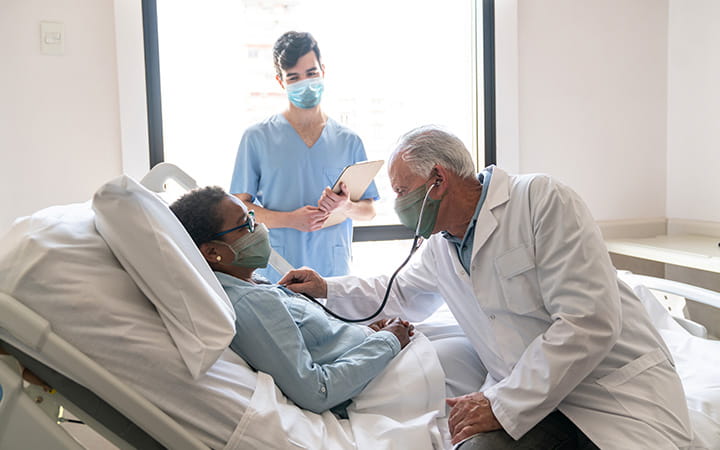Cancer Treatment and Cardiotoxicity: Best Ways To Protect Your Heart
December 02, 2021

Some cancer treatments have potential to damage the heart, which is called cardiotoxicity. Certain chemotherapy drugs as well as radiation therapy to the chest area can cause heart issues -- in some cases, years after cancer treatment.
Cancer drugs with cardiotoxic potential may increase risk of heart failure, irregular heartbeat and heart attacks, while radiation to the chest area for breast, lung and other cancers can damage heart tissues, including valves and arteries.
If you are a cancer patient at risk of heart problems from treatment, your oncologist will work with a cardiologist to evaluate risks and reduce potential cardiotoxic effects, says UH Harrington Heart & Vascular Institute cardiologist Zeeshan Hussain, MD.
Here, Dr. Hussain answers common questions that he hears from patients about cardiotoxicity:
Will my oncologist refer me to a cardiologist if needed, or should I ask to see a cardiologist before starting therapy?
Patients with existing heart disease, those at increased risk for heart disease and those who will receive potentially cardiotoxic therapies should be evaluated before their treatment and followed by a cardiologist. Most oncologists are aware of the need for referrals.
What questions should I be asking?
You should ask if you’re at increased cardiac risk and if the treatment is cardiotoxic. Also ask what can be done to reduce cardiac risk from this treatment.
What are symptoms of cardiotoxicity? What steps can I take to reduce my risk?
Shortness of breath, chest pain, palpitations, lightheadedness could all be signs or symptoms of cardiotoxicity. Particularly with cancer drugs, cardiotoxicity can happen without overt symptoms. Therefore, it is important to have periodic assessments if you are on such medications.
There are certain medications that can reduce future risk of cardiotoxicity. Maintaining a healthy weight and keeping your blood pressure and cholesterol under control are also good preventative strategies.
What type of heart function monitoring should I receive – and how often?
The heart can be monitored in a variety of ways before, during and after cancer treatment, if you are receiving radiation or chemotherapy that is potentially cardiotoxic. We use ultrasound with innovative and sensitive methods to quantify heart function. Biomarkers (i.e., blood tests) are also used for surveillance. If additional information regarding the amount of scar or abnormal proteins in the heart is required, a cardiac magnetic resonance imaging may also be considered. The exact type of test, and the frequency with which someone needs to be monitored, is typically at the discretion of the treating cardiologist.
Should have my heart function checked even though it’s been years since I underwent cancer treatment?
Certain chemotherapeutic agents carry a risk of cardiotoxicity that extend way beyond the duration of treatment. Particularly with radiation to the heart, the changes can manifest many years later and necessitate long-term follow-up.
Related Links
UH Harrington Heart & Vascular Institute offers more options for cardiovascular care close to home with multiple locations across Northern Ohio. Ongoing investments in our local facilities ensure our team has the latest tools and therapies available to continue to deliver truly personalized care for patients where and when they need it most. Learn more about cardiovascular care at University Hospitals.


